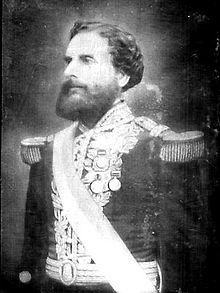Juan Antonio Pezet
| Juan Antonio Pezet | |
|---|---|
 |
|
| 4th Prime Minister of Peru | |
|
In office 1861–1863 |
|
| President |
Ramón Castilla Miguel de San Román |
| Preceded by | José Maria Raygada y Gallo |
| Succeeded by | Juan Antonio Ribeyro Estrada |
| 26th President of Peru | |
|
In office August 5, 1863 – April 25, 1865 |
|
| Preceded by | Pedro Diez Canseco |
| Succeeded by | Mariano Ignacio Prado |
| 28th President of Peru | |
|
In office June 24, 1865 – November 8, 1865 |
|
| Preceded by | Mariano Ignacio Prado |
| Succeeded by | Pedro Diez Canseco |
| Personal details | |
| Born |
11 June 1809 Lima, Peru |
| Died | 24 March 1879 (aged 69) Lima, Peru |
| Nationality | Peruvian |
Juan Antonio Pezet (11 June 1809 – 24 March 1879) was a Peruvian military officer and politician who served in the positions of Secretary of War, Vice President and the 26th and 28th President of Peru throughout his life. As President, his moderate and cautious attitude towards the occupation of the Chincha Islands by a Spanish Fleet in 1864 was used as an excuse to launch a military uprising that drove him out of power.
Juan Antonio Pezet Rodriguez Piedra was born in Lima, Peru, the son of Dr. Jose Pezet Monel, a physician, journalist, literary and parliamentarian who was among the enterprising heroes of Peru's independence. His French-born grandfather, Antoine Pezet Eustache, had arrived in Lima in 1765. As a boy, Pezet briefly entered the Jesuit College of San Carlos. When General José de San Martín with the Chilean army obliged the viceroy to evacuate Lima in 1821, young Pezet joined the patriots and took part in the campaign as sub-lieutenant. In 1823, he was promoted to lieutenant, and under Bolívar and Sucre, he fought at Junín and Ayacucho.
He became captain in 1828, and in 1835, as colonel of the battalion of sharp-shooters of Rimac, he took part in the rising of President Agustín Gamarra against the Peru-Bolivian Confederacy and was banished.
After his return, he was appointed prefect of Lima and took part in the revolution of Vivanco in 1843. During the revolt, he was appointed Inspector-General of the Army and Prefect of La Libertad. He was wounded and taken prisoner in 1844 but was pardoned, became prefect of Arequipa in 1847, and in 1848 was made general-in-chief of the division of the south and prefect of Moquegua.
Under President Echenique in 1853, he was appointed inspector-general and chief of the Army of the South during the invasion of Bolivia.
...
Wikipedia
